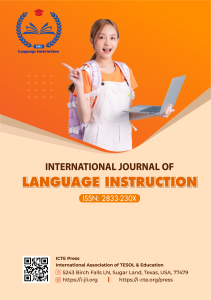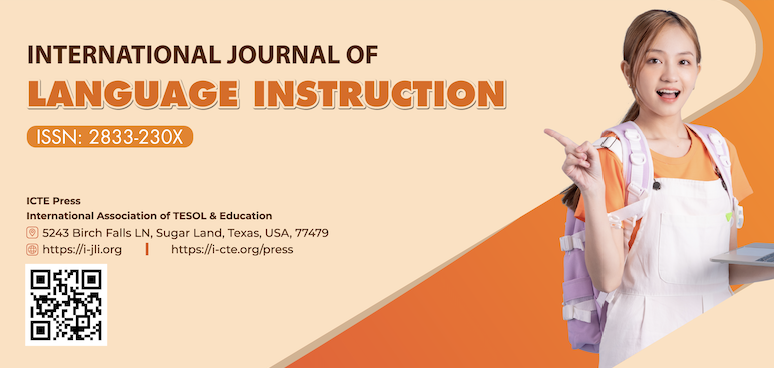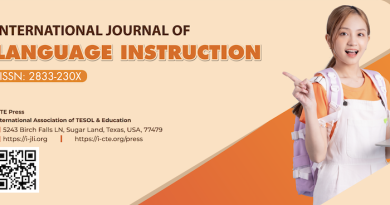Language Instruction: Vol. 4 No. 2 (2025)
Dear beloved language instructors,
 We are happy to let you know that Volume 4, Issue 2 (2025) of the International Journal of Language Instruction (IJLI) is now out. This issue features a large number of high-quality, peer-reviewed research articles that make a significant contribution to the subject of language education, especially in applied linguistics, language pedagogy, and new ways of teaching in different parts of the world.
We are happy to let you know that Volume 4, Issue 2 (2025) of the International Journal of Language Instruction (IJLI) is now out. This issue features a large number of high-quality, peer-reviewed research articles that make a significant contribution to the subject of language education, especially in applied linguistics, language pedagogy, and new ways of teaching in different parts of the world.
In this issue, Oneil N Madden, Sheldon Gordon, Rovel Chambers, Jason-Lee Daley, Dave Foster, Malik Ewan looked at what Jamaican foreign language instructors do with technology in the classroom and how they feel about it, especially ChatGPT. This study used a mix of approaches and had 28 teachers from primary, secondary, and higher schools filling out questionnaires. The results show that teachers like using technology to design lessons and get students involved, but they are worried about the accuracy of the content and the possibility of relying too much on AI. The study shows both the pros and cons of ChatGPT, stressing how important it is to carefully incorporate it into language teaching.
Md. Didarul Islam, Saleh Ahmad did a needs analysis study to find out what English language skills clothing sellers in Bangladesh needed. The mixed-methods research, which involved surveys and interviews with 30 junior to mid-level merchandisers, found that while merchandisers often use English for emailing and video conferencing, they have a lot of trouble speaking and writing. The authors stress how important it is to provide customized, flexible, and context-based English classes that meet the needs of merchandisers in their jobs.
Nguyen Thi Thu Hang, Truong Nhat Truong looked into how EFL sophomores at Van Lang University in Vietnam felt about using computer-assisted games (CAGs) in grammar lessons. The study used questionnaires and interviews with 70 people and concluded that students had a positive perspective of CAGs, noting that they helped with motivation, understanding, and language skills. The study stresses how adding interactive, technology-based activities to grammar lessons may make learning more interesting.
Thach Ngoc Mai Ly looked at how being extroverted or introverted affects how well EFL students at Tra Vinh University in Vietnam learn a second language. The study used surveys from 70 first-year English majors and interviews with three teachers. It concluded that extroverted learners did better, especially in speaking abilities, because they were more engaged and confident. On the other hand, introverted learners made slower progress. The article says that personality traits are important internal aspects that affect language learning and suggests that introverts should have support that is specific to their needs.
Tran Huynh Thinh, Huynh Duy Bao looked at how high school pupils felt about the Friends Global textbook in the context of Ho Chi Minh City’s educational changes. Using a mix of methodologies, including interviews with eight participants and research with 226 students, the study found that students had positive feelings about the reading, vocabulary, and grammar aspects of the textbook, but mixed feelings about the listening, speaking, writing, and phonology sections. The study focuses on what students think, which will help teachers choose textbooks and plan lessons in the future.
Last but not least, we want to thank the dedicated authors whose academic work is the main focus of this journal. We really appreciate your dedication to improving studies on language training.
We are just as grateful to our peer reviewers for their helpful comments, valuable insights, and thorough evaluations, which have guaranteed the quality and academic integrity of every paper that has been published.
We also want to thank our editorial board members from the bottom of our hearts for their ongoing guidance, editorial skills, and relentless support throughout the publication process.
We invite researchers, educators, and practitioners to explore this issue and engage with the research shared within.
Thanks God for everything!
With warm regards,
Associate Professor Dr. Pham Vu Phi Ho
Editor-in-chief
International Journal of Language Instruction
Full Issue
Vol. 4 No. 2 (2025): Language Instruction: DOI: https://doi.org/10.54855/ijli.2542



